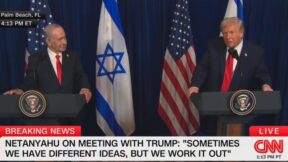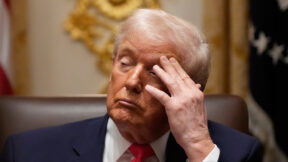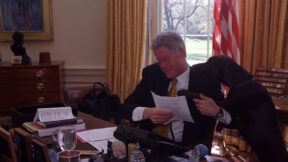Why The Economist Called on Trump to End the War in Gaza
Gregg Carlstrom, The Economist’s Middle East correspondent, joined Press Club to dissect President Donald Trump’s recent trip to the Gulf — and laid out why his magazine published an editorial calling on Trump to end the war in Gaza.
“There’s been a lot of argument about how we approach Gaza,” Carlstrom told Mediaite editor Aidan McLaughlin. “The leaders are where it’s been quite argumentative.” Those leaders — The Economist’s unsigned editorials that express the magazine’s institutional stance — are typically cautious, deliberate, and grounded in consensus. So when the outlet published a forceful editorial last week urging Trump to force a ceasefire, it made waves.
Carlstrom said the piece emerged from months of reporting and growing alarm over what Israeli officials were planning next. “Even by the standards of what came before, it was a horrifying plan,” he said, referencing Israel’s strategy to flatten Gaza, reoccupy it, and force more than two million people into a fraction of the territory. “We wrote about that particular plan, but we felt like we needed to go further than that.”
The resulting editorial didn’t mince words. It argued that Israel’s military campaign was failing to meet its objectives, devastating civilian life, and risking permanent displacement — all while serving the domestic political objectives of Prime Minister Benjamin Netanyahu and his far-right coalition partners. The piece urged Trump to act, insisting that US military and diplomatic leverage gave him the power — and obligation — to stop the war. “The way to do that,” Carlstrom said, “is to force Netanyahu to end the war, and use reconstruction as leverage over Hamas.”
The piece came ahead of Trump’s highly choreographed trip through Saudi Arabia, the UAE, and Qatar — and his conspicuous decision not to visit Israel. While some speculated that it was personal — revenge for Netanyahu’s early congratulations to Joe Biden in 2020 — Carlstrom believes the snub was strategic. “It wasn’t about personal animosity,” he said. “Trump wanted to come here and get some quick wins. Israel doesn’t offer him any big wins like that.”
In contrast to the Gulf States, which pledged hundreds of billions in investment and gave Trump a hero’s welcome, Israel had little to offer him politically. “There wasn’t going to be any progress on Gaza because Netanyahu was just so obstinate,” Carlstrom said. “So there was almost no point for Trump, for what he wanted to get out of this trip.”
Still, the geopolitical optics of skipping Israel — while embracing Gulf leaders and floating a Hamas-brokered hostage deal — sent a message. “There is a willingness on the part of Trump to go over Netanyahu’s head,” Carlstrom noted, referencing secret negotiations and deals that left Israeli officials surprised, including with the Houthis in Yemen.
As for his own outlet’s shift in tone, Carlstrom was candid, “There’s not really any pressure to write things a certain way.” But the decision to publish an editorial calling for an end to the war wasn’t inevitable — it was hard-won.
“We felt like we needed to make a very clear argument,” Carlstrom said. And that argument — rare for a magazine as institutionally cautious as The Economist — is now part of the record.
Mediaite’s Press Club airs in full Saturdays at 9 a.m. on Sirius XM’s POTUS Channel 124. You can also subscribe to Press Club on YouTube, Apple Podcasts, or Spotify.





Comments
↓ Scroll down for comments ↓